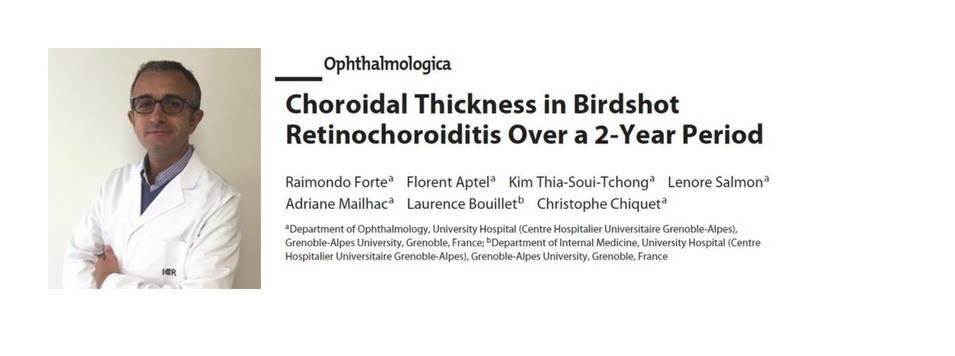
Dr. Raimondo Forte, ophthalmologist of the Department of Retina and Vitreous of the ICR, has published an article on the choroidal thickness in patients with Birdshot chorioretinopathy in the prestigious international scientific journal Ophtalmologica.
Birdshot chorioretinopathy is a rare type of bilateral posterior chronic uveitis characterized by multiple hypopigmented choroidal lesions, vitritis and retinal vasculitis related to the human leukocyte antigen A29.
The appearance of eye floaters, blinding and flashes, difficulty in distinguishing colors and the loss of visual acuity are some of the symptoms.
It is characterized by the appearance of bilateral choroidal lesions around the optic nerve that resemble pellet gun wounds. That is why this pathology is known as Birdshot. This pathology is usually associated with macular edema.
To diagnose this disorder, functional visual field tests are performed such as global and multifocal electroretinogram; in addition to anatomical tests, such as fluorescein, indocyanine green angiography (ICGA) or optical coherence tomography (OCT).
In the article, changes in the choroid in eyes with Birdshot chorioretinopathy are analyzed over a period of two years.
To do so, 30 patients (26 eyes) were chosen and studied for 2 months with tests such as standard automated perimetry (SAP), fluorescein, indocyanine green angiography and optical coherence tomography (OCT).
Moreover, enhanced depth imaging optical coherence tomography (EDI OCT) was also used.
The article concludes that, after two years, patients with Birdshot chorioretinopathy present a thinning of the fovea choroid and an increase of the suprachoroidal fluid.
In addition, it is estimated that symptoms may worsen even in the absence of severe retinal inflammation or visual loss. At this time, studies continue to evaluate these shreds of evidence.
This study is a scientific advance for the diagnosis and management of this pathology that, to this day, lacks an optimal treatment for this type of uveitis.

Contact us or request an appointment with our medical team.